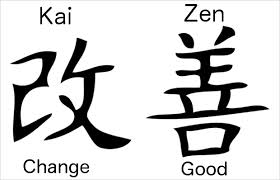LIA
A huge thank you to the teachers and staff at LIA. Your enthusiasm, friendliness, and warm welcome made this week very easy for me.
Hope to see you again soon!
Good news and bad news
Well, the good news is that I have control of this website back after the technical problems that took it down last week.
The bad news is that I am going on a trip next week and will be off-line for a couple of weeks.
Coverage will resume in mid-March. Hope to see you then 🙂
curriculum eikaiwa expectations language courses school management university
by sendaiben
2 comments
Kaizen, the art of gradual improvement
An essential part of program development
I mentioned kaizen (continuous improvement) at the end of my talk on ER program design.
Kaizen is making things better, continuously. Basically finding and solving problems over and over again. Over time, this results in huge improvements and the evolution of programs.
I’ve been very fortunate to be able to work with my colleague Dan E at Tohoku University, who is a master of kaizen. Thanks to this, our extensive reading program is several orders of magnitude better than it was when we started collaborating.
At Cambridge English as well, thinking back to when we started over ten years ago the school and the classes are unrecognizable. Almost everything we do, we do better now.
But kaizen does not happen automatically. It requires teachers to have the desire and the ability to make changes. It also requires a culture of development, where problems lead to solutions that are implemented across the board. Communication is essential and talking about problems with colleagues leads to better solutions.
Some examples of kaizen at Tohoku University:
- improving worksheets so that students understand them better
- developing bilingual explanations
- sharing effective class activities
- developing protocols to deal with cheating
- having students write book reports in class instead of for homework
Examples of kaizen at Cambridge English:
- developing electronic and paper record keeping
- writing student names in romaji on everything (books, notebooks, attendance cards)
- developing lesson plans
- choosing materials
- organizing the classroom
As you can see, nothing groundbreaking. The main point is that improvements are continuous, problems are dealt with as they come up, solutions are reached through communicating with colleagues and are implemented by everyone.
Kaizen is barely noticeable in the short term, but over a longer period the improvements are staggering.
Do you have any positive or negative experiences with kaizen?
VIDEO: Extensive Reading Program Design
This is a short lecture given as part of a Sendai JALT meeting (the Extensive Reading Colloquium) in January 2014. It was held at the Tohoku University Library.
Here is the ER Program Design handout that accompanies this talk.
Five local teachers also talked about their ER programs according to a common template. They answered the questions below:
- Where is ER placed in your curriculum?
- What is the disposition of faculty/administration towards ER?
- How many students/classes are doing ER?
- What are the goals of the program? Who sets them? How are they evaluated/revised?
- How do you measure student achievement? Is there any follow up after a student completes the program?
- What system do you have set up to order and manage books? How many books do you have at what levels?
- What is the future of ER at your institution?
Cory Koby
Daniel Eichhorst
Dominic Jones
John Wiltshier
Marc Helgesen
I’m afraid my video camera died during the panel session so I don’t have a video of that. I would also like to apologize to Dom -you’re just too tall, mate 😉
Thanks to everyone that presented and attended, and especially to Sendai JALT for organizing the meeting: I think we all learned a lot.
JALT Sendai Extensive Reading event at Tohoku University Library (January 26 14:00-17:00)
An Exploration of Extensive Reading Programs
These weekend JALT Sendai will hold an extensive reading event at the Tohoku University Library (Kawauchi Campus in Sendai). I’ll be giving a short lecture on extensive reading program design, which will be followed by short talks by local teachers about their extensive reading programs. We will finish off the day with a panel discussion and audience questions.
Schedule:
14-15 ER Program Design (Ben Shearon)
15-16 Introduction to ER Programs (various presenters)
16-17 Panel discussion / Q&A session
17~ Optional tour
More details: JALT Sendai website.
It is shaping up to be a really interesting, practical event. Hope to see you there!



